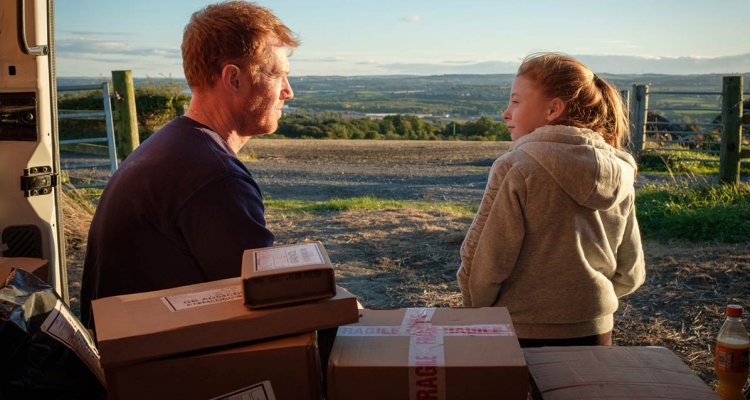German filmmaker R.W. Fassbinder once remarked, “I would like to build a house with my films. Throughout his career, Cannes staple Ken Loach, has likewise constructed a monument to the dignity of the working class. Building this metaphorical domicile since the 1960s, his corpus investigates the workers building that home and the families inhabiting it. This parable is at play in the literal construction in “Riff-Raff,” or the neighborly decorating that takes place in “My Name Is Joe.” Loach’s latest film “Sorry We Missed You”—the director’s 14th Competition selection at the Cannes Film Festival—is yet another look at the household of a family under great financial strain and dehumanizing labor standards. As typical as it may sound from the outside, tender and devastating in turn, “Sorry We Missed You” is essential viewing.
READ MORE: 2019 Cannes Film Festival: The 21 Most Anticipated Movies
“Sorry We Missed You” traces the day-to-day of working-class Turner family, living in London. Patriarch Ricky (Kris Hitchen, captivating in his first big-screen lead role), who has struggled to make ends meet for most of his life, finds a “franchise” opportunity with courier PDS. Pitched as self-employment, the job is instead an unconscionable abuse of labor that puts an enormous strain on the Turner household. Meanwhile, wife Abby (newcomer Debbie Honeywood) works as an underpaid house-call care worker, doing her utmost to treat her patients with dignity while her own is threatened. The children are left to their own devices; teenage Seb (Rhys Stone) skips school and shoplifts while 11-year-old Liz (Katie Proctor) must serve as the Turners’ inadvertent moral arbiter.
READ MORE: the 100 Most Anticipated Films Of 2019
The Turner clan are relatable in their struggles; charming in the brief moments of respite from life’s rigors and fallible in the impossible choices they must make. Liz’s childish crafts hang from the rear-view mirror of the van Ricky leases, lending personality to an otherwise nondescript white vehicle. Seb’s rebelliousness is a particular point of contention; his family fails to recognize his clandestine tagging as an outlet for unrewarded creativity and emotion. The kitchen table is as much a site for meals as it is one for disciplinary interventions. The physical attack in the home space late in the film finds “Sorry We Missed You” at its most heartrending, with an intriguing link to the titular declaration in “I, Daniel Blake.”
READ MORE: The 25 Best Films Of 2019 We’ve Already Seen
The above fails to do justice to Abby’s warm of spirit and indispensable role, both in the workplace and the household. There is the overriding—and old-fashioned—assumption that the man must be the breadwinner of the family. Early on, Ricky coerces Abby to sell the car for liquid cash for the van’s down payment and subjecting her to the inconveniences of public transit. Honeywood is well-cast in the role, approaching every crisis with a lilting voice. Her generosity towards her patients is deeply touching, overworked but motivated out of duty rather as opposed to Ricky’s financial urgency. There is also the sorrowful implication that these elderly strangers fill a void in Abby’s home life.
READ MORE: Summer Movie Preview: 35 Films You Shouldn’t Miss
Loach pulls no punches towards the target of his ire in “Sorry We Missed You,” at one point naming the companies whose quick-shipping promises fuel the abusive delivery companies: Amazon, Apple, Samsung, and others. As the heartless manager Maloney (Ross Brewster) bluntly states, the priority is keeping the black boxes (the tracking guns) happy. The cost is the human scale of an increasingly online experience for which the human behind the package becomes a non-entity.
“Sorry We Missed You” marks director of photography Robbie Ryan’s fourth collaboration with Ken Loach. The unpretentious images—intuitively calibrated to Loach’s realist sensibilities—couldn’t be further from Ryan’s stylized, borderline experimental work on “The Favourite.” Loach rarely resorts to dramatic punctuation, which makes the handful of close-ups all the more impactful. The manipulation inherent in the composition of the film frame is a challenge to the value system of “Sorry We Missed You”; moments of humiliation are treated delicately and render the characters with respect. As a consequence, the precious poetic indulgences really sing, such as a brief interlude where father and daughter enjoy a light lunch as the sunlight breaks through the clouds.
Why does Ken Loach continue to make films, even after announcing his retirement with 2014’s “Jimmy’s Hall“? Simply enough, late capitalism continues to invent new injustices for his principle-driven filmmaking to shine a light on. Some might say the director lays it on thick with his harsh realism—“Sorry We Missed You” also makes reference to the collection and sale of data, and overburdened emergency rooms—all details that accurately reflect the world we live in. Only the depiction of cell phones approaches a proselytizing tone, given prominence as the main source of communication for the fractured Turner clan.
In the opening sequence, Ricky notes, “There’s always someone on your back, isn’t there?” It’s an indication that the bind he finds himself in, torn between an all-consuming livelihood and the family he needs to nurture, is unsolvable. A heart-in-the-throat final act will leave you second-guessing pulling the trigger on your next Amazon Prime delivery, with its very human cost. [A-]

